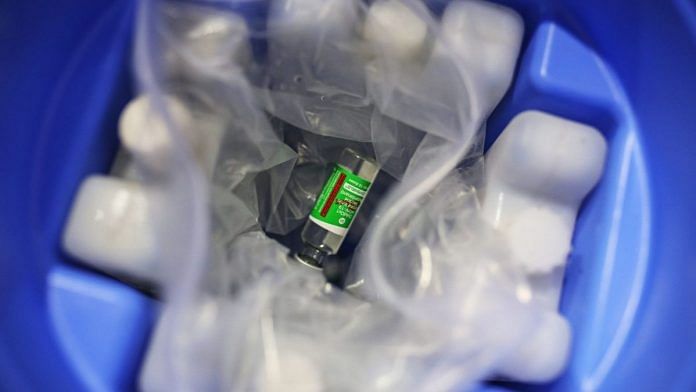
Text Size:
Bengaluru: A longer delay of upto 45 weeks before the second dose of the Oxford-AstraZeneca vaccine, manufactured as Covishield in India, leads to enhanced immune response, a study by Oxford University researchers has found.
The researchers, in the preprint of the study, also concluded that a third dose of the vaccine will lead to a substantial increase in immune response.
This study is significant as many countries, including India, have chosen to delay the second dose in light of shortages in the supply of the Covishield vaccine.
In May, the Modi government had said that the second dose of the Covishield vaccine can be taken after a gap of 12-16 weeks from the first dose as opposed to the earlier stipulated 6-8 weeks. This led to uncertainty over how effective the vaccine will be in providing protection against the virus.
“Vaccine shortages have resulted in some people receiving a first dose of ChAdOx1 nCoV-19 without receiving the second dose within the recommended 4-12 week period,” the researchers said about the implications of the study. “We report that increasing the interval as far as 45 weeks results in an increased antibody titre after the second dose, offering greater flexibility in vaccination schedules.”
Also read: Bihar & UP worst performers on state Covid vaccination list, only 10% have got 1st dose
How the study was conducted
The researchers studied the effects of the delayed second dose through Phase 1/2 (COV001) and Phase 2/3 (COV002) of the ongoing clinical trials of the Oxford-AstraZeneca vaccine.
In the trials, the participants, who were in the 18-55 year age group, were administered either the Oxford-AstraZeneca (ChAdOx1 nCoV-19) vaccine or a meningococcal vaccine as a control.
“As a comparison cohort for those with a long interval between first and second doses in COV001, a subset of participants from COV001 and COV002 who had received two doses of ChAdOx1 nCoV-19 with varying prime-boost intervals were selected for inclusion in analyses,” the study noted.
Data of the initial phase 1 group in COV001 was also analysed “to observe the persistence of immune responses after a single dose”.
Reactogenicity data of 321 participants and immunogenicity data of 261 participants, which were available from the two trials, were used in the study. While reactogenicity refers to the person’s reaction to the vaccine, immunogenicity refers to the ability of a vaccine (or a foreign substance) to provoke an immune response.
The participants had been given the second dose at gaps of 8-12 weeks, 15-25 weeks or 44-45 weeks.
Then in March this year, the researchers added a substudy to the Phase 1/2 trials and 90 participants who had been administered two doses and 40 control participants were recruited to test the effects of a third dose.
Of them, antibody responses were checked in 75 participants while “spike specific cellular immune responses” were analysed in 15.
Also read: ‘Taken this up at highest levels’, Poonawalla assures India as EU Green Pass excludes Covishield
The findings
Antibody levels remained elevated above baseline levels for a year following the administration of the first dose. The levels peaked at 28 days and halved by 180 days and reached 0.30 of peak level by day 320. A second dose led to a 4 to 18 times increase in antibody responses within a month of the administration of the dose.
“Furthermore, an extension of the dose interval (up to 45 weeks) between the first and second dose further enhances the immune response to the second dose, when compared with shorter dose intervals,” the study said.
This was significant. The researchers found that the antibody titers were at 923 in those who had been given the second dose in the 8-12 week interval, 1,860 in those given the jab in the 15-25 week interval and 3,738 in those who were administered the second dose in the 44-45 week intervals.
“Six months after (the) second dose, antibody levels remained significantly higher in the group with 15-25 week interval between doses compared with 8-12 week interval,” it said.
The researchers also found that antibody levels and spike-specific T-cell response after the third dose were significantly higher than after a second dose. Moreover, “neutralising antibody titres following a third dose were higher than those after (the) second dose against the Alpha (B.1.1.7), Beta (B.1.351) and 221 Delta (B.1.617.2) variants”.
Fewer participants had adverse reactions following the second dose and third dose than the first dose.
The limitation of the study included lack of T-cell data after a late second dose, “limited tolerability data after the second dose available for those who were recruited to receive a third dose, and [a] small number of participants available at a year after a single dose”.
“A single dose of ChAdOx1 nCoV-19, with a second dose given after a prolonged period, may therefore be an effective strategy when vaccine supplies are scarce in the short term,” the researchers concluded.
(Edited by Arun Prashanth)
Also read: Why India’s record vaccinations this week may not stop a deadly third wave
Subscribe to our channels on YouTube & Telegram
Why news media is in crisis & How you can fix it
India needs free, fair, non-hyphenated and questioning journalism even more as it faces multiple crises.
But the news media is in a crisis of its own. There have been brutal layoffs and pay-cuts. The best of journalism is shrinking, yielding to crude prime-time spectacle.
ThePrint has the finest young reporters, columnists and editors working for it. Sustaining journalism of this quality needs smart and thinking people like you to pay for it. Whether you live in India or overseas, you can do it here.
Delaying 2nd AstraZeneca vaccine shot by upto 45 weeks improves immune response: Oxford study - ThePrint
Read More

No comments:
Post a Comment